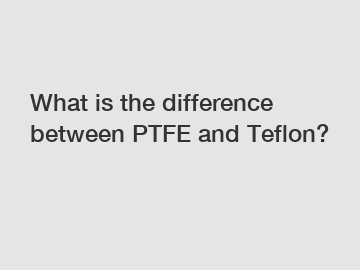What is the difference between PTFE and Teflon?
What is the difference between PTFE and Teflon?
When it comes to nonstick coatings, two common terms are often used interchangeably - PTFE and Teflon. While they may sound similar, they are not exactly the same thing. In this article, we will explore the differences between PTFE and Teflon, shedding light on their characteristics, properties, and applications.
PTFE: The Primary Component.

PTFE, or PolyTetraFluoroEthylene, is a synthetic fluoropolymer of tetrafluoroethylene. It was first discovered by accident in 1938 by a chemist named Roy Plunkett while working for DuPont. PTFE is a high-performance polymer with a wide range of applications owing to its unique properties. Since it is made up of only carbon and fluorine atoms, PTFE possesses exceptional chemical resistance, low coefficient of friction, and excellent thermal stability. These beneficial characteristics make PTFE a popular choice for various industries.
Applications of PTFE:
1. Nonstick Coatings:
One of the most well-known applications of PTFE is in nonstick coatings for cookware. The exceptional nonstick properties of PTFE make it an ideal choice for preventing food from sticking to the surface of pots, pans, and baking sheets. The slick nature of PTFE allows for easy release of food without the need for excessive oil or cooking sprays.
2. Electrical Insulation:
Due to its high dielectric strength and excellent electrical insulation properties, PTFE is commonly used in the production of wires, cables, and connectors. It can withstand high voltages and extreme temperatures, making it suitable for demanding electrical applications.
3. Sealing Materials:
Due to its resistance to chemicals and high temperatures, PTFE is widely used as a sealing material in industries such as oil and gas, pharmaceuticals, and food processing. It can effectively create a barrier against corrosive liquids or gases, preventing leaks and maintaining system integrity.
Teflon: The Brand Name.
Teflon, on the other hand, is a brand name used by Chemours, a spin-off of DuPont, to market their line of PTFE-based products. The name Teflon has become synonymous with nonstick coatings, often used to describe any cookware with a nonstick surface. While Teflon is made from PTFE, it is essential to understand that not all PTFE products are Teflon. Teflon offers a wide range of products suited for various industries and consumer applications.
Characteristics and Benefits of Teflon:
1. Durability:
Teflon-coated products are known for their durability and resistance to scratches, abrasions, and wear. The coatings provide a protective layer that extends the lifespan of the underlying material, making it highly desirable for industrial and household applications.
2. Heat Resistance:
Teflon can withstand high temperatures without degrading, maintaining its nonstick properties even at extreme heat. This characteristic makes it suitable for high-temperature cooking methods such as baking, broiling, and roasting.
3. Easy Cleaning:
The nonstick surface of Teflon products makes them easy to clean. Food residue and stains do not adhere strongly to the coating, allowing for effortless cleanup with minimal effort.
Conclusion:
In summary, PTFE and Teflon are closely related but not identical terms. PTFE is the generic name for the synthetic polymer, while Teflon is a brand name used to market PTFE-based products. Both materials offer exceptional nonstick properties, chemical resistance, and thermal stability. Understanding the difference between the two can help consumers make informed decisions when purchasing nonstick products or considering applications in different industries.
If you have any questions or need further information about PTFE, Teflon, or their applications, please do not hesitate to contact us.
For more information, please visit expanded ptfe sheet manufacturers, expanded teflon sheet, ptfe tube manufacturer.


